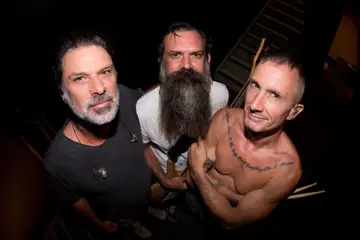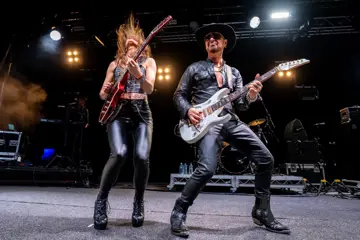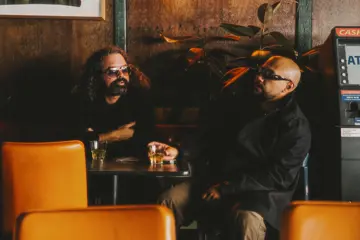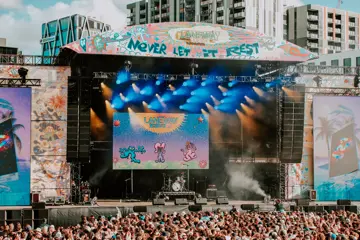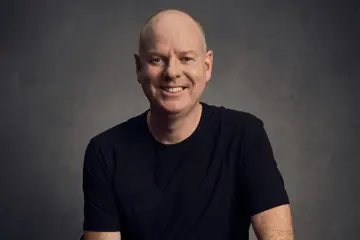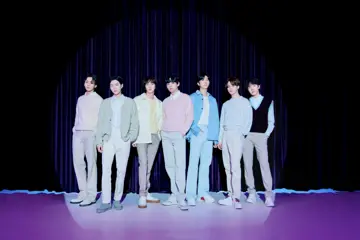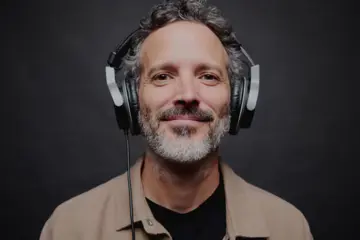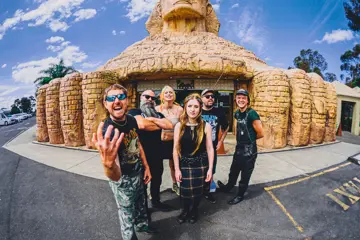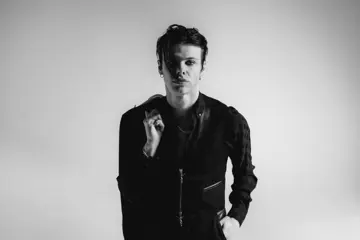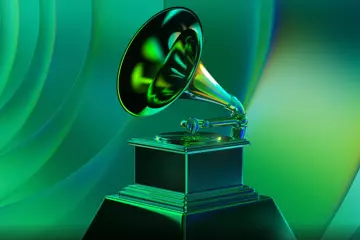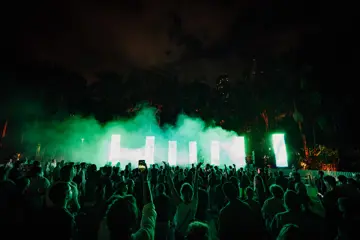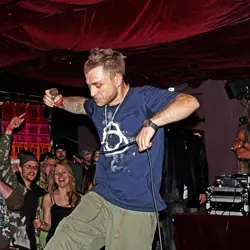 Dub FX
Dub FXBenjamin Stanford is in a pretty good place when Drum reaches him in Melbourne, sounding very upbeat at the prospect of enabling his fiancée Shoshana Sadia – otherwise known as Flower Fairy – to live in Australia with him. “Just with my lady - we just handed in my partner's visa application for permanent residency so we're a little bit excited about that.”
And he's also got good cause to be excited about his own career which, after a hectic past five years that originated in London (where he met Sadia, who now accompanies him on tour selling CDs and joining him live on stage), is finally slowing down a little to give him more time to focus on aspects outside of touring. “Basically for the past five years me and my partner have just been around manically doing shows, living day by day. It started off performing in bands and travelling around and street performing, and now it's kind of arrived to a point where for the first time in my career as Dub FX I've been able to buy a house, and I'm building a studio. And I've not had to do any shows for a few months for the first time in so long, man I can't remember the last time I had a month off,” he tells, in a very relaxed manner that suggests he's looking forward to the time off.
“It's really exciting for me just being able to chill for a bit and work on other things for a bit that have been going on in my life that I've had to put on hold. The main thing really has been organising myself a recording studio because I've always had to do it on the fly with bands or set up somewhere in a house… That's been my thing really, I've not been doing any shows, just organising new material and trying to record it and setting it all up.”
Stanford began playing in bands from the early age of 15 around St Kilda in Melbourne, until a move to the UK led to him dabbling in the art of loop stations and beatboxing to create entire songs from scratch. Meeting Sadia introduced him to the sounds of drum'n'bass, jungle and dubstep, which became his primary focus, busking on the streets with just a loop pedal station and his own voice.
Don't miss a beat with our FREE daily newsletter
And after playing bigger and bigger club and festival shows for the past couple of years, Stanford has definitely hit the point where it's no longer just about tripping people out on the street with crazy vocal work and loopy song structures. “I've kind of hit a landmark, if you know what I'm saying,” explains Stanford. “I've arrived at a point where I'm not struggling so much. Well, I am in a way because I have to pay off my house, but I've got to the point where if I was to lose an arm or a leg or my voice or something, and I couldn't go on tour, I'd at least be happy with what I've got now and I could stop and work on other things. Now that I've got this I'm able to do better shows and better tours and better albums because I've got somewhere that I can totally work on creating something. I've always been working but I've always been on the road, I've never had a chance to set myself up to pull out some quality tunes.”
All of this will of course come once he's completed his next tour, which sees him in Perth next week for some pre-Anzac Day festivities, and then onto the rest of the world. He's also doing it under a new, much tighter schedule. “Obviously I've got a fair few shows coming up in May, and then June I'm going over to Europe, and August/September is America. It's kinda gonna be like a year's worth of work. What I've normally done is this over a year, but now I'm cramming it into five months. We always used to do maybe two, three nights a week, and that's over a whole year on average. But this time it's gonna be five nights a week for five months; it's gonna be intense, but then I can just come back and chill again.”
It's a new touring ethic that he's trying not to worry about too much just yet. “I'm not nervous nor am I excited about it, I'm more just trying not to think about it because the idea of it just exhausts me. I'm trying as hard as I can to not, because I really have over-worked myself these last five years, to the point where I burnt out quite badly, like I was unable to do many shows by the end, so it's been good to build up my energy a bit. I'm trying not to think about the touring too much though. Obviously once I get into the swing of it it'll be fine. I don't really get nervous or excited about playing shows, I just do what's required. Obviously putting on an awesome show that's what's required of me so I'm gonna do it.”
His frankness is a feature of the entire interview, coming to a head with some very interesting revelations on what he feels about his own craft, and the limitations that come with making your own beats with just your voice. “Definitely it's very limited, and I hate beatboxing to be honest. I hate beatboxers, I hate beatboxing, I think it's stupid to be honest. The only reason I started doing it was because I needed a way to make a beat on the street. At first I was using backing tracks, but I saw someone else using a loop station and beatboxing so I incorporated that into my sets, I'd used backing tracks and play guitar and sing, and I'd also have a loop station, and then I sort of realised people were more interested in the looping thing, so I went down that road.
“And I definitely enjoy doing it but there's only so far you can really take it. You get to a point where you hit a wall,” he continues, detailing how he's overcoming these limitations. “You can only do certain things with it. That's why I'm now using a drum machine as well. I find, especially for drum'n'bass and jungle, I'm not even that good a beatboxer… The thing is that I'm more of a singer/songwriter than I am a beatboxer, I don't really call myself a beatboxer at all. It's all about making decent basslines and making people dance at the end of the day, not really so much about showing people my skills.”
And it's this last point that reveals what truly gets people excited about Dub FX; it's not about a wacky gimmick, but about the music. “I respect the song structure more than the gimmick, you know what I mean? And people come to my shows not because I'm a beat boxer or looper but because they're interested in the tunes that I make or the songs that I've written. Whether it's with a full band or with beatboxing or whatever, I think people are more interested in the music anyway.”

